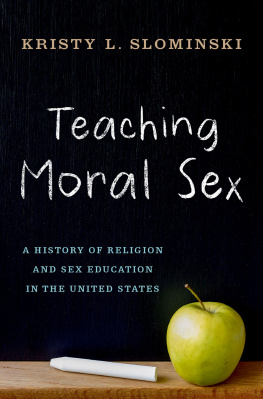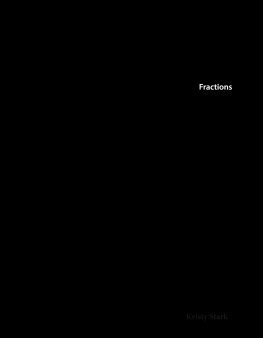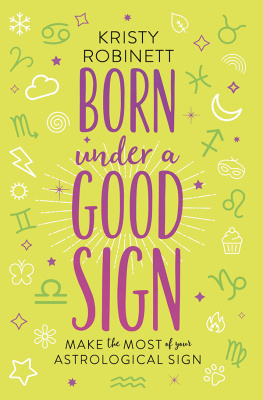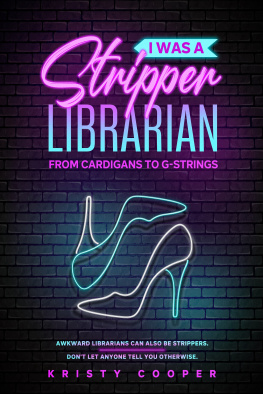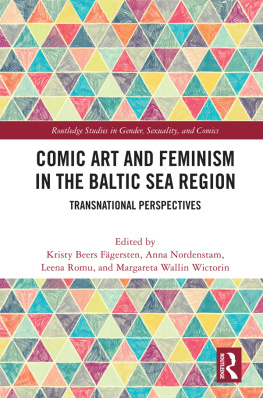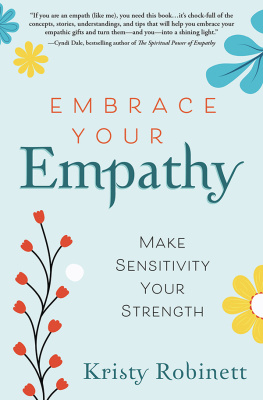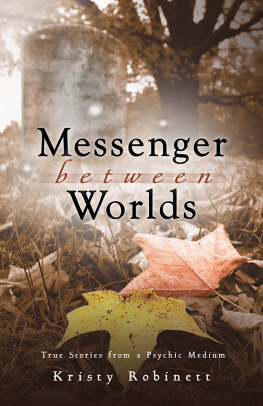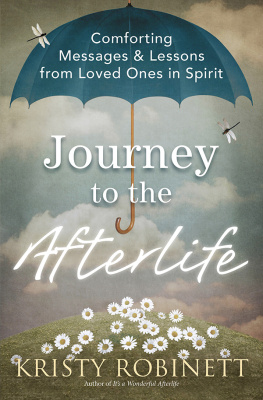Teaching Moral Sex

Oxford University Press is a department of the University of Oxford. It furthers the Universitys objective of excellence in research, scholarship, and education by publishing worldwide. Oxford is a registered trade mark of Oxford University Press in the UK and certain other countries.
Published in the United States of America by Oxford University Press
198 Madison Avenue, New York, NY 10016, United States of America.
Oxford University Press 2021
All rights reserved. No part of this publication may be reproduced, stored in a retrieval system, or transmitted, in any form or by any means, without the prior permission in writing of Oxford University Press, or as expressly permitted by law, by license, or under terms agreed with the appropriate reproduction rights organization. Inquiries concerning reproduction outside the scope of the above should be sent to the Rights Department, Oxford University Press, at the address above.
You must not circulate this work in any other form and you must impose this same condition on any acquirer.
Library of Congress Cataloging-in-Publication Data
Names: Slominski, Kristy L., author.
Title: Teaching moral sex : a history of religion and sex education in the
United States / Kristy L. Slominski.
Description: New York, NY, United States of America : Oxford University Press, 2021.
| Includes bibliographical references and index.
Identifiers: LCCN 2020025281 (print) | LCCN 2020025282 (ebook) |
ISBN 9780190842178 (hardback) | ISBN 9780190842192 (epub)
Subjects: LCSH: Sex instruction for youthUnited StatesReligious aspects. |
Sexual ethics for youthUnited States. | Public schoolsUnited States.
Classification: LCC HQ35 .S5276 2020 (print) | LCC HQ35 (ebook) |
DDC 176.0835dc23
LC record available at https://lccn.loc.gov/2020025281
LC ebook record available at https://lccn.loc.gov/2020025282
DOI: 10.1093/oso/9780190842178.001.0001
Contents
While my book concludes with a call to give humanities disciplines a greater voice in shaping public sex education, I am aware of how much humanities research is generated from unpaid and underpaid labor. My research cites many excellent studies from scholars who lack institutional support for their research. I am grateful for all of these valuable donations that have enriched my knowledge base and scholarly conversations, and I am disappointed that industries built around the pursuit of knowledge have consistently taken these contributions for granted.
Over the course of writing this book, I have lived in five states, worked at five universities, and had two children. During this chaotic period, I could not have seen this book to completion without institutional support or the help of family, friends, and colleagues. In 2018, the Department of Religious Studies and Classics at the University of Arizona decided to invest in me and my research through my current position as Assistant Professor of Religion, Science, and Health. It is a dream job and I am thankful, especially to my department chair, Karen Seat, and the dean of the College of Humanities, Alain-Philippe Durand, who both made this possible.
The research for this book could not have been completed without grants from the following: the American Academy of Religion; the Provost at the University of Arizona; the Capps Center for the Study of Ethics, Religion, and Public Life and the Graduate Division at the University of California, Santa Barbara; Harvard Universitys Schlesinger Library on the History of Women in America at the Radcliffe Institute for Advanced Study; and the University of Minnesotas Social Welfare History Archives at the Andersen Library. I am also thankful for those at Oxford University Press for believing in this manuscript, especially my editor, Theo Calderara.
My scholarship is shaped by my training, and I am proud to have received my B.A. from Michigan State University and my M.A. and Ph.D. from the University of California, Santa Barbara. The Religious Studies Department at Michigan State University was filled with incredible teacher-scholars who still inspire my teaching and research, including Chris Frilingos, Mohammad Khalil, and, most significantly, Amy DeRogatis, whose continued mentoring and friendship has been invaluable for my survival in academia. At Santa Barbara, I was fortunate to have an all-star dissertation committee of people whom I both respected and liked, including Catherine L. Albanese, Patricia Cline Cohen, Ann Taves, and Wade Clark Roof. During the writing of my dissertation, three of them retired and they were kind enough to stick with me through graduation. I owe a special thanks to Pat, for her thorough comments and encouragement, and Cathy, for chairing my committee and caring enough about my work to dedicate so much red ink to its improvement. I am honored to have worked with such brilliant and thoughtful trailblazers.

